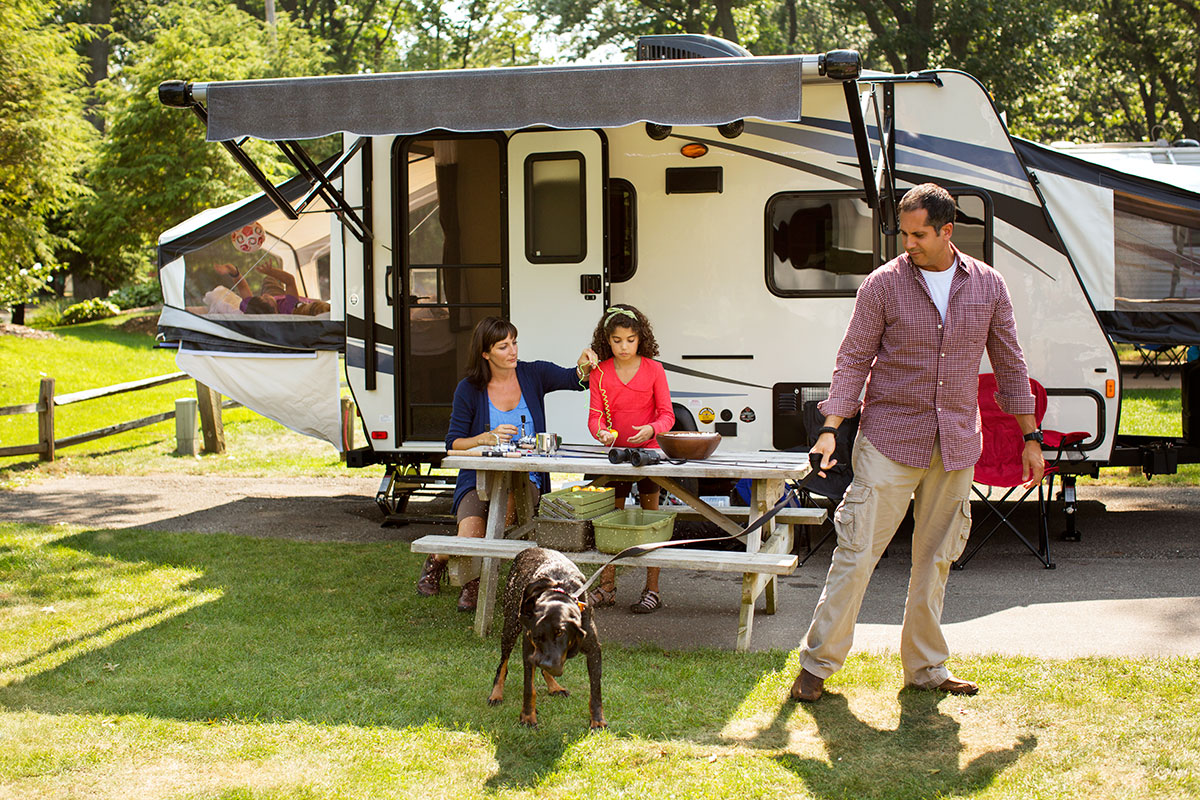Your RV is your home away from home, perhaps even your permanent home. Think about that: your home. It serves as your base, the place where you eat and sleep, a place where you create new memories and share them with others. Like a warm hearth, a cozy, familiar RV is nice to come home to.
When you enter a campground, RV park, or RV resort, your designated site becomes your territory. It has borders. It has rules. You will have neighbors, fellow RVers who feel the same as you do regarding their RV and the space around it. Even though you may be in a different setting, etiquette still applies.
Common Areas
The space where you park your RV is only a small part of the big picture. Campgrounds, parks, and resorts can accommodate hundreds of sites and people, and many of them have common areas such as swimming pools, arcades, fishing ponds, and more. Not to mention, there might be common shower houses and bathrooms within the grounds or near the beach. Common courtesy rules the day in common areas: wait your turn, be respectful of other people’s space, the normal stuff.
Roadways and paths are also common areas. Avoid littering or smoking near groups of people (or make your way to a designated area), and be aware of how loud you are conversing, especially at night. Campsites are not common areas, so don’t try to take shortcuts through other campers’ sites. Use appropriate paths and walkways around the campground, and to and from RVs.
Neighbors
We’ve all had this experience – a neighbor who was too loud or too messy. Most RVers are not this way, but it’s important to remember to remain mindful of your surroundings. If you’re watching TV or listening to the radio, keep the volume down. That courtesy also applies to when you’re sitting out at the campfire or eating a meal outdoors.
Be neighborly, meaning help newcomers back up their RV if they seem to be having difficulty, welcome them to the campground, and look out for one another, such as checking departing RVs to make sure nothing was left behind or left on that might be hazardous or expensive to fix should something happen during the drive. Likewise, refrain from talking with someone as they are hooking up towed vehicles, backing an RV into its space, or going through their checklist when preparing to leave. Distractions can lead to missing steps, forgetting items, or reducing safety.
We don’t have a lot of space in our RVs to accommodate entertaining. If you’re invited over to another site, assume – and offer – that you’ll need to bring your own chairs and glasses if you’re going to be hanging out for a time outside, such as for a meal or around a campfire. Be hospitable in sharing treats and drinks, and always offer to bring something along.
And one of the most important things: keep your campsite clean and organized.
Pets
Your dog or cat may be your best friend, but don’t assume that everyone else feels that way. Some people are afraid of larger dogs, or they may be allergic to cats. Don’t let your pet wander at will. Keep it confined to your campsite using a long lead or enclosed area. Hopefully your pets, especially dogs, have been taught proper etiquette as well and will refrain from barking when commanded. All dogs bark, which most people understand, but a dog that barks incessantly is a disturbance for all.
If you’re invited over to someone else’s RV site and you are reluctant to leave your pet behind, don’t assume you can bring your pet along. Ask first, and if the answer is yes, always wait for an invitation for your pet to enter the RV.
And even though it goes without saying, make sure to clean up after your pet. For dogs, that means picking up any “gifts” – especially if they are in common areas or on other campsites. Try to get your dog to a less populated area first. For cats, clean the litter box and don’t leave a mess outside your RV. For additional reading, take a look at our article “10 Tips for Camping with Your Dog.”
Groups
If you are traveling and camping as a group, then there are some additional areas of etiquette that require some discussion. It’s okay to not do everything together, including eating meals. You may want to just spend some time with your family or special someone for lunch or dinner. The diversity of physical endurance and outdoor/indoor interests by the individuals within the group will also bring about differences in who goes along to certain activities.
At the campsites, take turns hosting and making meals when everyone is getting together. On the road, it’s probably better for each RV (each family) to pay for their own meals.

